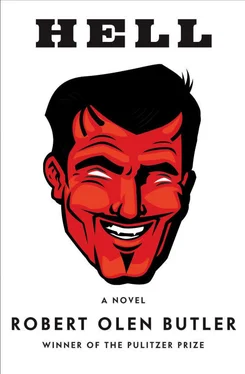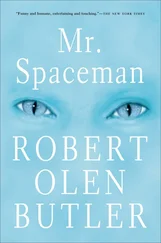And so Hatcher crosses the lobby of the Raffles Hotel with Sir Francis Bryan, Henry VIII’s longtime drinking buddy and master of the henchmen, poet and roving diplomat, sent to the Pope when Henry first sought a Catholic divorce for the sake of Anne, and a master of jousting as well, which is how he lost his eye. The eye is unrestored in the afterlife, though Bryan has come to see that as an ironic benefit — one less body part to hurt when it is time for everything to hurt. “Sir Francis Bryan, at your service,” he says.
“Hatcher McCord, presently at your disposal.”
Bryan chuckles. “He will do that.”
“You’re his vicar?”
“Lay vicar, I must stress.”
They step out onto the veranda. A table at the front is being vacated by an elderly couple in hunting jodhpurs who stagger off the veranda and out into the desert, clutching at their stomachs.
“Some people shouldn’t drink,” Bryan says.
The two men move toward the vacated table, and on the way, Hatcher is surprised to find Bill and Hillary Clinton sitting together. She’s staring vacantly out to the mountains. Bill’s mouth is drawn down sadly and he’s stirring his gin with the tip of a forefinger. Hatcher stops beside them. Hillary ignores him, but Bill looks up from the slow swirling of his drink. “Hello, Hatcher,” he says.
“Mr. President. You escaped the hotel room.”
Bill Clinton tilts his head very slightly in the direction of his wife. “She showed up.”
“I see.”
“It seems it was her I was waiting for all the time.”
Hatcher doesn’t ask the question that instantly springs to mind. Hillary is still quietly averting her eyes from both men. Bill licks the tip of his finger and returns to stirring his drink with it.
Hatcher looks toward Sir Francis Bryan, who is claiming the vacated table. Hatcher is about to move off, but he is still a journalist, after all, and he must ask the question.
“Mr. President,” Hatcher says.
Bill looks up.
“Did you drop your pants when she arrived?”
Bill smiles. “It surprised the hell out of her.”
And with this, though she continues to look out across the desert as if she were alone, Hillary extends her hand and lays it on Bill’s arm. Bill looks at his wife’s hand, and Hatcher cannot see — but rightly assumes — the faint lingering of the smile.
Hatcher heads off to the table, and he knows that the tender gesture he just saw pass between the presidential couple will, in this place, only lead to larger pain and mutual torture. But in the freedom of his mind, Hatcher holds the gesture apart from all that will surely follow, and he too smiles a small smile.
He sits down with Sir Francis Bryan, and they are both facing the mountains. A monocled and mutton-chopped white man, a former Governor-General of India, wearing a dhoti overhung with a starvationdistended belly, instantly arrives with a tray and two gin slings, which he puts on the table. He bows deeply and backs away.
Hatcher nudges the drink away with his knuckle, shuddering at what the Raffles Hell might be substituting for the cherry brandy. He looks at Bryan, who has taken off his top hat and placed it on the table in preparation for his drink. Bryan is a bald man with the fringe of his hair close-cropped and with a faintly aquiline nose. He swirls the dingy ice in his gin sling, takes out the swizzle stick, and compulsively downs about a third of it in one gulp. He turns away to gag and cough and spit. When he has recovered somewhat and is sitting upright again, his hand still clutching at his burning throat, he glances at Hatcher’s drink, untouched, migrated toward the center of the table, and he looks at Hatcher and narrows his good eye while raising the eyebrow over his bad one.
“Some people shouldn’t drink, vicar,” Hatcher says.
“I thought we all must, in this place,” Bryan says.
Hatcher understands. His freedom of mind is showing, but he does not take up the gin. “It’s torture for me not to touch the stuff,” Hatcher says.
This satisfies Bryan. “Of course,” he says. “You know how I came to that nickname with His Majesty?”
“Not because you were of holy demeanor.”
Bryan laughs. “Indeed not. His Majesty and I and Thomas Wyatt and Nicholas Carew and George Boleyn and some others were great companions and full of jests, and His Majesty once asked me as we sat at dinner, ‘What sort of sin is it to ruin the mother and then the daughter?’ And I replied, ‘Sire, it is a sin like that of eating a hen first and its chick afterwards.’ The King laughed loud and heartily at this and said when he was done, ‘Well, you certainly are my vicar of Hell.’ And we all laughed louder and more heartily still, and the name was imprinted upon me thereafter.”
Hatcher has been forcing his mind away from what might be happening inside the hotel. But what he has heard in this anecdote is the power of sexual privilege possessed by the truly prominent and wealthy, experienced to some extent by Hatcher in his earthly demi-celebrity, but not nearly as strongly as by kings and billionaires. He turns his mind to the likelihood that he will leave this place alone today.
And inside Sir Francis Bryan: Sire, Geoffrey Plantagenet married Matilda, granddaughter of William the Conqueror, and they begat Henry II, King of England, who begat Eleanor Plantagenet, who married Alphonso IX, King of Castile, who begat Eleanor of Castile, who married Edward I, King of England, who begat Edward II, King of England, who begat Edward III, King of England, who begat Thomas of Woodstock, Duke of Gloucester, who begat Lady Anne Plantagenet, who married Sir William Bourchier, who begat Sir John Bourchier, who begat Sir Humphrey Bourchier, who begat Lady Margaret Bourchier, who married Sir Thomas Bryan, who begat me. My blood is the blood of four kings of England and our Norman conqueror, and through them my blood is the blood of Charlemagne the Great and Clovis the Great and Boadicea, our great Briton queen who rose up against the Romans before there was an England. And yet it is the way of mortal life that I was destined to end up merely playing the role of Your Majesty’s jester and go-between instead of you playing mine. But Hell is oddly comforting in that regard, sire, for it appears that we are all of us here, all the seed of all the righteous, world-bestriding, wealth-wielding, nation-making, genocidal men since the beginning of time. And they themselves are all here too. And as for the drastic differences of privilege and power that make human beings so inescapably and arbitrarily unequal for that brief mortal span? Those differences are mere surface ornamentations now to our eternal suffering. Thus sayeth your vicar, sire.
Unbeknownst to Sir Francis Bryan — and unnoticed by Hatcher — Bryan’s own seed, twelve begats along, sits a few tables over, a man with an aquiline nose writing in a Moleskine sketchbook with a Waterman 494 sterling silver Bay Leaf fountain pen. With Noodler’s Antietam red ink, flexing the Waterman’s nib, thickening the downstrokes, the man writes: “It has been long enough.” And he pauses. He turns and says to his table companion, a bent and liver-spotted Graham Greene, whose mind has wandered in the few seconds of silence that has fallen between them, “What were we saying?” Greene is thinking about the Nobel Prize never won and about the lost bougainvillea and white-washed villa walls in Anacapri. He turns his face to the man with the Waterman, which is still poised in the air. “I don’t remember,” says Greene. “Neither do I,” says the other man.
And a few tables down, Hatcher thinks: It has been long enough . And Hatcher pardons himself and rises and turns and heads for the door into the hotel. As he passes the Clintons, Bill catches him by the arm, stops him. “She’s wrong about how I won,” Bill says.
Читать дальше












